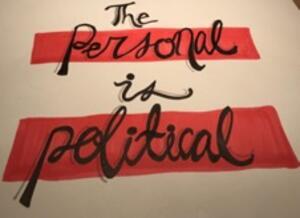Politically Personal: Personally Political
The transition from eighth grade to freshman year is a rough one. Especially if you’re going from a small Jewish school to a large public school, and especially if most of your friends are going to other schools, and especially if you have the notoriously difficult English teacher™ (yes, you know the one).
Going into English class, I was scared out of my mind. I had no idea how to handle the level of work (both in terms of quality and quantity), and my teacher’s infamous reputation didn’t help calm my nerves in the slightest. My goal at the beginning of the year in English was to do my best, complete the work, and hopefully get good grades.
However, as I sat and listened in class, I found myself being pulled out of the bubble I had created for myself. The discussions we had were not just about English; they also related directly to my personal life and values. We discussed democracy’s fundamental ideals compared to its execution, examined the human psyche through the eyes of multiple psychologists and drew our own conclusions, learned about the feminist movement, and examined Audre Lorde’s work. I found myself growing as a feminist and as a student, confronting my biases, and becoming more socially aware.
To me, being a feminist means working to achieve equity for all members of society, confronting personal bias, alleviating institutional sexism, and prompting others to do the same. There are so many ways feminism manifests itself in my life, but until freshman English class, I didn’t even think to consider one of the most significant ways that I’m involved in political feminism.
Mid-year, my English class started discussing feminist theory, and looking at text through a feminist lens. My teacher introduced us to Carol Hanisch, a radical feminist and pioneer of the 1960s’ Women’s Liberation movement. In 1970 Hanisch published an essay titled “The Personal is Political” in which she argues that discourse between women has huge political significance. In the essay, Hanisch describes analytical “therapy” sessions where women gather to discuss their opinions on society and their personal lives, making connections and “telling it like it is.” They open up about their problems—not to be “deemed weak,” but to say what they believe rather than what they’ve always “been told to say.” Hanisch believes that women are pressured to see their lives through “rose-colored glasses,” and that moving away from that pressure is political in itself. Women discussing problems in life with other women is a form of “collective action” working toward “a collective solution.”
This importance of discourse between women has been a given in my life for as long as I can remember—so much so that I never actually considered its significance and have simply accepted it as mundane. I have a lot of female friends and we discuss our problems all the time. We rant about school (“The American school-system is so messed up!”) and homework (“It’s like each of my teachers think that their class is my only class!”) and teenage life in general (“How come guys are cheered on for having lots of relationships but girls are called sluts?”) all the time. I participated in a school seminar last year where female students came together to discuss religion, learn more about each others’ faiths, and examine all kinds of theological texts through a feminist lens. I have been privileged enough to feel comfortable expressing my doubts and worries to the women who surround me in all parts of my life and to listen to their problems in return without feeling weak or defeated.
These discussions, in all of their perceived mundanity, have a huge effect on my life, and on the lives of so many women. If women didn’t engage in personal discourse with each other, we wouldn’t feel heard or connected, and we wouldn’t be able to work towards a collective solution to the issues that frequently affect our lives. In this way, women’s discourse is fundamental, bringing the personal into the political sphere and stressing women’s everyday problems, not just the major feminist issues that dominate headlines and are perceived as innately political.
I had always thought that I would have to work to implement my feminist values in everyday life, and that the most influential and significant feminist progress happens in the public sphere of celebrities and politicians. Instead, I realized that it happens at the lockers, during lunch, on the subway home from school, and even in English class.
This piece was written as part of JWA’s Rising Voices Fellowship.








so beautiful Ava! Uppity Women Unite!
Ava, you inspire me. You’re absolutely right about the power of connection among women. I’m so proud of who you are.
Wow, Ava. So well-written. The last line is amazing. You're so lucky to have your mother, and both grandmothers as role models. Go Sister!
Awesome!! This is so cool!
Awesome!